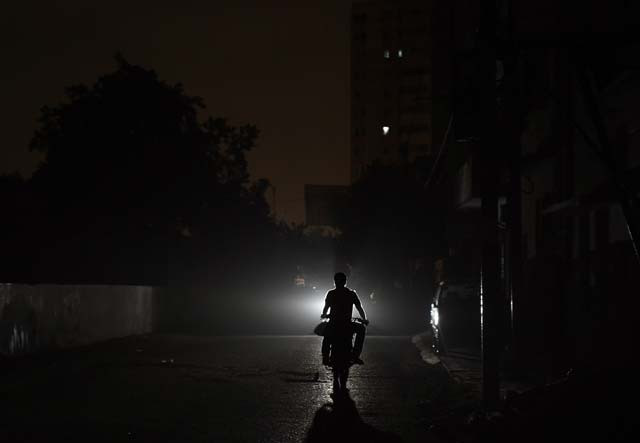Dagha blames Met office for prolonged power outages
Ex-power secretary insists weather dept failed to accurately forecast heatwave

PHOTO: AFP
In a high-level meeting held on April 24, the ex-secretary pointed out that electricity demand grew sharply and demand-supply gap widened following an unprecedented heatwave at the end of March and early April 2017.
Khawaja Asif confident that ‘power supply situation’ will improve
He called the temperature forecast of the Met office highly inaccurate in comparison to actual temperatures, which were up to nine-degree Celsius higher than the monthly average.
The prime minister was of the view that changing weather patterns should have been projected while preparing the load-shedding plan for the summer of 2017.
He noted that the Ministry of Water and Power had clearly committed that load-shedding in summer would be for three hours in urban areas and for four hours in rural regions.

However, the plan was not followed at all. In fact, the duration of load-shedding was 100% more than the approved plan. The premier asked about reasons for the deviation from the earlier commitment.
He stressed that the rise in temperatures by two to three-degree Celsius should not have resulted in a big increase in load-shedding. Moreover, lower water availability was never highlighted in earlier presentations made to the Cabinet Committee on Energy.
He emphasised that load-shedding for more than 12 hours in April could not be accepted as it caused huge hardships to the people. The government was answerable to the people and excuses could not be made to justify the abrupt increase in power outages, he said. Dagha pointed out that temperature had been expected to remain one to two-degree centigrade above normal in April 2017. However, its sudden increase by seven to nine-degree centigrade was quite extraordinary.
Moreover, the temperature in Skardu was minus 4-degree centigrade, which halted the melting of snow on mountains, leading to lower levels of hydroelectric power generation.
He claimed that the water and power ministry had made concerted efforts over the past two years to bring down load-shedding from eight hours to three hours in urban areas and from 10 hours to four hours in rural regions by addressing the constraints.
K-Electric, consumer groups both unhappy with new tariff
Apart from this, collections and savings amounting to Rs200 billion had been made through higher bill recoveries, lower line losses and other corrective measures. “The International Monetary Fund (IMF) has also acknowledged the achievements of the Ministry of Water and Power,” he said.
Electricity supply would improve in the current month as some new power plants were expected to start production, he said and suggested that the government should continue to apply its earlier work plan for reduced load-shedding.
Speaking in the meeting, the new water and power secretary said load-shedding was being carried out for six hours in urban areas, 8 to 12 hours in rural areas and four hours in mixed industrial load areas. There was no load-shedding for the independent industrial load areas.
However, the areas falling within the jurisdiction of Tribal Areas Electricity Supply Company (Tesco) were enduring 18 hours of blackouts both in urban and rural regions.
He said the Ministry of Water and Power met officers of all distribution companies through a video conference on April 20 to discuss the load management plan for summer. It was decided that the distribution companies would utilise the maximum electricity allocated by the National Power Control Centre and ensure minimum load-shedding in their respective areas.
Published in The Express Tribune, May 6th, 2017.
Like Business on Facebook, follow @TribuneBiz on Twitter to stay informed and join in the conversation.



















COMMENTS
Comments are moderated and generally will be posted if they are on-topic and not abusive.
For more information, please see our Comments FAQ